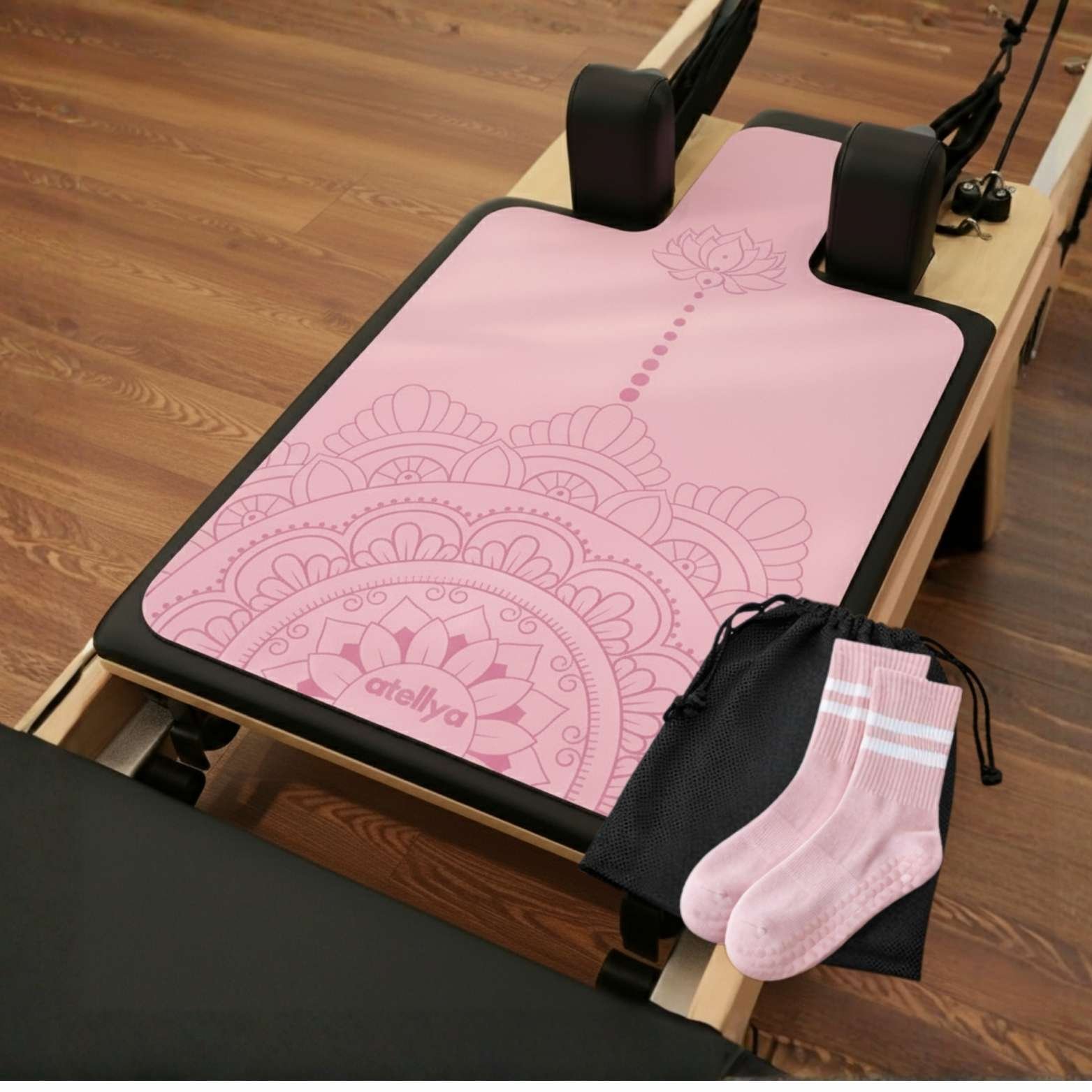Pilates Reformer Mat Covers that Boost Hygiene Grip and Comfort
Choosing the right pilates reformer mat cover can help protect your equipment, support hygiene, and create a comfortable, non-slip surface for every session.
This guide explains how to size, fit, and care for your cover, with gentle tips for both home and studio use. You will also find an easy step-by-step process, key features to look for, and answers to common questions. If you are comparing a Pilates reformer cover, a reformer carriage cover, or a universal option with elastic straps, this guide aims to make your decision easier.
Table of Contents
- Key Benefits of a Reformer Mat Cover
- Step-by-Step Guide: Selecting, Fitting, and Caring for a Reformer Mat Cover
- How to Choose the Right Size Reformer Mat Cover
- Materials and Features to Look For in a Reformer Mat Cover
- Care and Maintenance for a Reformer Mat Cover
- FAQ Section: Reformer Mat Cover Questions
A reformer mat cover is a simple, protective layer designed to sit on top of your reformer’s carriage. If you use a reformer at home or share equipment in a studio, a well-fitted reformer mat cover can help protect upholstery, support hygiene, and enhance traction. Whether you are comparing a Pilates reformer cover, a reformer carriage cover, or a full reformer machine cover for dust protection, this guide offers considerate advice to help you choose and care for the right option. You will also find support for common questions such as, “What size reformer mat cover do I need for my brand of reformer?” and “How do you clean and maintain a reformer mat cover?”
Key Benefits of a Reformer Mat Cover
- Helps protect the carriage upholstery from oils, lotions, and everyday wear.
- Encourages cleanliness and can simplify wipe-downs between sessions, an especially kind step in shared spaces.
- Provides a consistent, non-slip surface that supports confidence during movement.
- Offers a softer, more comfortable touch that many users appreciate during longer sessions.
- Can reduce pilling or scuffing on the original carriage surface over time.
- Supports studio presentation by keeping equipment looking neat and well-cared-for.
- Complements other Pilates reformer accessories, such as shoulder rests covers and handle wraps, for a cohesive setup.
Step-by-Step Guide: Selecting, Fitting, and Caring for a Reformer Mat Cover
Step 1: Measure the reformer carriage accurately
Measuring first helps you choose a reformer mat cover that fits well and stays secure. Note the carriage length, width, and the height or thickness of the carriage pad. If your model has shoulder rests that encroach on the carriage, please measure the usable area between them. If headrests are adjustable or removable, consider how the cover will sit around that feature. Many brands share similar dimensions, but a precise measurement reduces guesswork.
Step 2: Choose materials and features thoughtfully
A washable non-slip reformer mat cover for Pilates studios may be helpful if you need quick cleaning between sessions. Breathable fabrics feel gentle on the skin. Non-slip weave patterns can help with grip. If you prefer flexibility, a universal fit reformer carriage mat cover with elastic straps can adapt to small size differences across models while staying in place.
Step 3: Verify size and fit before first use
Before your first session, place the cover on the carriage and check that corners, elastic, or straps sit flat and do not interfere with shoulder rests or the headrest hinge. A reformer carriage cover should feel smooth with no bunching. If the cover includes labels or seams, align them as recommended by the maker, and ensure the glide path remains unobstructed.
Step 4: Install the reformer mat cover gently
Slide the front edge over one end of the carriage, then stretch the fabric along the surface. Tuck elastic edges or corner bands under the pad to secure them. If there are additional fasteners, attach them evenly on both sides. The goal is a snug, even surface that supports movement without slipping.
Step 5: Clean and store with care
Wipe the surface after each use and allow it to air-dry. For routine washing, please follow the label. Many covers prefer cool water, mild detergent, and low-heat drying or air-drying. If you store the cover, make sure it is clean and fully dry before folding to prevent creases or odors.
How to Choose the Right Size Reformer Mat Cover
Selecting the correct size helps your reformer mat cover stay flat and supportive during use. While some covers are model-specific, many are flexible enough to fit a range of carriages, especially those with elasticized edges. If you are unsure, a sizing chart can be reassuring. You may also compare your measurements to the published dimensions of the cover and allow a small tolerance for stretch.
What size reformer mat cover do I need for my brand of reformer?
Each brand can vary slightly in carriage length and width. As a considerate approach, measure your carriage and compare those numbers to the cover’s range. If your reformer sits between sizes, a universal option with elastic straps may offer a gentle, adaptable
A quick size and fit checklist
- Length: Measure the full carriage length, excluding the footbar.
- Width: Measure the padded surface between shoulder rests.
- Thickness: Note pad depth if the cover wraps under edges.
- Headrest: Consider whether it folds or adjusts and how the cover accommodates it.
- Straps: Confirm that elastic or corner bands will not interfere with moving parts.
Materials and Features to Look For in a Reformer Mat Cover
When you review materials and build quality, a few thoughtful details can make daily use more pleasant. The right surface feel supports comfort. Stable traction supports consistent movement. Easy-wash construction keeps care simple.
Fabric types and surface feel
Soft-touch polyester blends often feel gentle and dry quickly. Cotton-rich blends may feel familiar and cozy. Some covers use a knit or micro-texture to support traction. If you appreciate a cushion-like feel, consider a slightly thicker weave, while keeping in mind how it influences glide and heat.
Non-slip and breathability
Non-slip properties can help you feel secure during transitions. Breathable fabrics allow airflow and may feel more comfortable in warm rooms. If you prioritize gentle grip and easy care, a medium-weight knit with a textured face can be a balanced choice for regular sessions.
Elastic straps and secure closures
Elastic corner bands and skirted edges help the cover stay in place without shifting. If multiple reformer types are used in your space, a universal fit reformer carriage mat cover with elastic straps can support a snug fit across different models. If your routine includes frequent cleaning between users, easy-on, easy-off straps may feel especially considerate.
Studio versus home priorities
Studios may value quick-clean, durable fabrics that maintain a neat appearance throughout the day. A washable non-slip reformer mat cover for Pilates studios can help streamline turnover between sessions. At home, you might prioritize softness and color to match your space. Either way, choosing a cover that complements your routine will likely feel reassuring.
Care and Maintenance for a Reformer Mat Cover
With simple, consistent care, a reformer mat cover can remain fresh and supportive. The following tips are based on common fabric care practices. For best results, please follow the specific instructions provided with your cover.
After each session
Wipe the surface with a mild cleaner suitable for textiles, then allow it to air-dry. This gentle step can help maintain a clean surface and reduce buildup of sweat or oils.
Weekly care routine
Regular washing helps keep fabrics fresh. Many covers prefer cool water, mild detergent, and a gentle cycle. To protect elastics, low-heat drying or air-drying is often kinder. If you are caring for multiple covers, washing similar colors together can help keep them looking even.
Occasional deep cleaning
From time to time, you may wish to run an extra rinse or use a delicate bag for laundering. If a stain appears, spot-treating quickly with a fabric-friendly solution may be helpful. Please avoid harsh chemicals that could weaken fibers or elastics.
Drying and storage
Ensure the cover is completely dry before folding. Store in a breathable space away from direct heat. If you rotate covers, storing flat can reduce creases and keep edges smooth for your next session.
If you would like to explore options or compare features, you may find the reformer mat cover page helpful. For broader information and updates on accessories, the homepage may also be useful.
FAQ Section: Reformer Mat Cover Questions
How do you clean and maintain a reformer mat cover?
Most covers benefit from gentle, regular care: wipe down after each session, then machine-wash as directed with mild detergent. Cool water and low-heat or air-drying often support fabric integrity.
Is a reformer mat cover the same as a reformer machine cover?
They serve different purposes. A reformer mat cover sits on the carriage to support hygiene and traction during use. A reformer machine cover typically drapes over the entire machine to help protect it from dust when not in use. Some practitioners choose both for a complete care routine.
Will a universal cover fit my reformer securely?
Many universal options use elastic edges or corner straps to adapt to small dimension differences across brands. For best results, measure your carriage and compare to the cover’s published range. If in doubt, consider an option with adjustable straps for a kinder, more secure fit.
Which features should I prioritize if my space is shared?
Quick-drying, non-slip fabrics and easy-on, easy-off straps may be especially helpful for shared use. Clear labeling and a simple care routine can also streamline changeovers between sessions and help keep the equipment looking tidy.

Atellya RitualsBlogger www.atellya.com

Atellya Rituals

